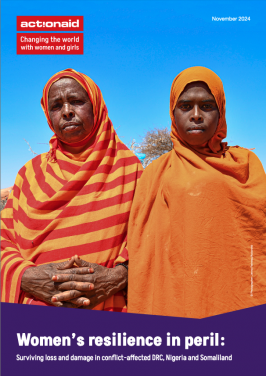Surviving loss and damage in conflict-affected DRC, Nigeria and Somaliland
A collaboration between ActionAid DRC, ActionAid Nigeria, ActionAid Somaliland and ActionAid UK, this research looks into how women and girls in DRC, Nigeria and Somaliland have built resilience in a hostile environment, both in regards to their safety and in their abilities to become community leaders.
Executive summary
Climate change is driving extreme weather events that escalate in intensity with each passing year. The burden of climate change disproportionately falls upon countries that have historically contributed the least to global emissions. Women and girls in the Global South face disproportionate losses and damages. Many Fragile and Conflict Affected States (FCAS) are the most vulnerable to climate change, but have the least capacity to address loss and damage due to centuries of exploitation by Global Northern countries. Due to the perceived risk of operating and delivering assistance in fragile environments, FCAS receive the least climate financing. The capacity of humanitarian actors is limited to emergency relief in the immediate aftermath of disasters and conflict, meaning that addressing loss and damage, including rebuilding, recovery and building resilience, is all but impossible. Women are often the first responders when disaster strikes, however their organisations receive little support.
